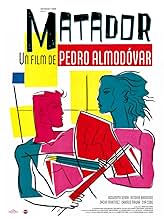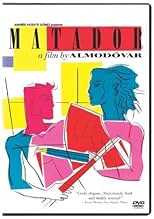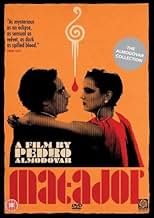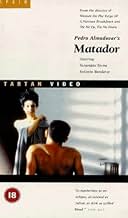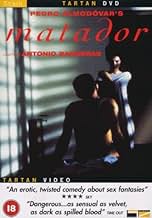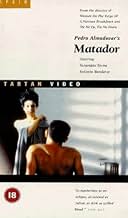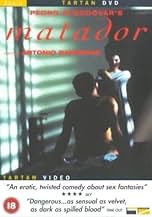AVALIAÇÃO DA IMDb
6,9/10
14 mil
SUA AVALIAÇÃO
Um toureiro é ferido por um touro e não pode mais matar na arena. É apenas uma falha, além de muitas outras de vários personagens que colidem de forma insuspeita.Um toureiro é ferido por um touro e não pode mais matar na arena. É apenas uma falha, além de muitas outras de vários personagens que colidem de forma insuspeita.Um toureiro é ferido por um touro e não pode mais matar na arena. É apenas uma falha, além de muitas outras de vários personagens que colidem de forma insuspeita.
- Direção
- Roteiristas
- Artistas
- Prêmios
- 6 vitórias e 7 indicações no total
Nacho Martínez
- Diego
- (as Nacho Martinez)
Bibiana Fernández
- Vendedora Flores
- (as Bibi Andersen)
Verónica Forqué
- Periodista
- (as Veronica Forque)
Mercedes Jiménez
- Alumna 3ª
- (as Mercedes Jimenez)
Francesca Prandi
- Alumna 4ª
- (as Francesca Romana)
Avaliações em destaque
Matador is an early Almodovar work that explores the relationship between sex and violence through the medium of bullfighting. It follows a love quadrangle between a retired matador, his repressed student, the matador's lover, and the student's lawyer, as a series of murders takes place in Madrid. Dark comedy ensues in the midst of murder investigations and extremely loud eighties fashions.
The performances make this decidedly odd film work. Assumpta Serna is great as the lawyer, while Antonio Banderas makes an early appearance as her client. Carmen Maura also has a small role, even though her character is somewhat lacking in development. The characters remain convincing even as the plot spins into the out right bizarre.
Some viewers might complain that the film's explicit sex and violence make it little different from an exploitation film, and indeed it opens with a character masturbating to a slasher movie. Furthermore, its commentary on sex and violence at times seems pretentious. However, the film is far more creative and well made than any exploitation film, and is well worth your time.
The performances make this decidedly odd film work. Assumpta Serna is great as the lawyer, while Antonio Banderas makes an early appearance as her client. Carmen Maura also has a small role, even though her character is somewhat lacking in development. The characters remain convincing even as the plot spins into the out right bizarre.
Some viewers might complain that the film's explicit sex and violence make it little different from an exploitation film, and indeed it opens with a character masturbating to a slasher movie. Furthermore, its commentary on sex and violence at times seems pretentious. However, the film is far more creative and well made than any exploitation film, and is well worth your time.
If you're a fan of Pedro Almodovar, you'll love this one from 1986.. filmed in Madrid, it has all the usual elements: offbeat characters who meet up and get even crazier, like atoms smashing together. when a young matador Angel (Antonio Banderas at 26) thinks his heroes have committed crimes, he confesses to them to take the fall. watch that opening scene.. .pretty rough stuff: (simulated) sex, nudity, and murder, all in one. his lawyer has her own kinky issues, and wants to defend Angel. Look for the usual Almodovar cast, with Carmen Maura and Chus Lampreave. Assumpta Serna is the sexy, flirty, over-sexed Maria. and the gory bullfights, which play a big part in the story. Secrets. everyone has their secret. which ones will come out? Liaisons... more secrets. will the police find the real killer(s)? it's very good. intrigue.
Every Artist has a reoccurring theme, that he successfully or unsuccessfully explores and tries to capture through out his life time, and that eventually becomes his, what we might call - style. With Ingmar Bergman it's the detachment from life and confronting death, with Woody Allen, the comical absurdity of man-woman relationship, with Filliny it's the nostalgia for the lost, often irreplaceable innocence of childhood. In case of Pedro Almodovar though, to put it lightly, it's unorthodox, sex crazed love stories. (love that guy!)
I had watched three films by him (Bad Education, Law Of Desire, Talk To Her), and all of them were rather twisted, but this one is defiantly the weirdest love fable I had ever seen or read even by his standards.
The story begins with a young man, (played by heavenly-gorgeous, 18 year old Antonio Banderas) who is studying to be a matador, under a world famous, but retired, due to an injury, Maestro. One night after being suspected of being a homosexual, he decides to prove his masculinity and toughness by attempting to rape Maestro's girlfriend. But being in reality a very innocent and tender soul, he literally faints before anything happens, when she accidentally cuts her finger.
The girls reports him, and while being questioned, the cops hang on him three more murders. Apparently there have been bodies popping up through out the city, with all the victims assaulted in the same strange manner - at the height of their sexual arousal, they are stabbed in the back of their necks, with a hair pin, with the same technique a toreador brings a bull down.
And now, brought together by serendipity, the female lawyer, who had come to defend Antonio, and is investigating the case, is beginning to have a sort of an "affair" with the Maestro. Both of them being obsessed with sex, violence and mostly important death, which they find the most arousing thing in the world. Imagine Romeo and Juliet, only where they both not only desire each other sexually, but also long for each other's death.
I had personally often wondered, why the element of violence is so often present in sex. Even when one makes love, no matter how gentle, there will be some hair pulling, slight choking or biting. To experience pain and dominance, seems to be counterintuitive to receiving pleasure, yet something in our wiring arouses us by that. With books like "Fifty Shades Of Grey' bondage and sadomasochism had become house hold names, and practices. But what I can't wrap my brain around is why do these seemingly, logically unpleasant activities arouse us?
The theme in this film, of the desire to kill the one you love, and to define death and brutal violence as sexy, that is bound to make an indelible imprint on your soul and to stay with you for the rest of your life.
I had watched three films by him (Bad Education, Law Of Desire, Talk To Her), and all of them were rather twisted, but this one is defiantly the weirdest love fable I had ever seen or read even by his standards.
The story begins with a young man, (played by heavenly-gorgeous, 18 year old Antonio Banderas) who is studying to be a matador, under a world famous, but retired, due to an injury, Maestro. One night after being suspected of being a homosexual, he decides to prove his masculinity and toughness by attempting to rape Maestro's girlfriend. But being in reality a very innocent and tender soul, he literally faints before anything happens, when she accidentally cuts her finger.
The girls reports him, and while being questioned, the cops hang on him three more murders. Apparently there have been bodies popping up through out the city, with all the victims assaulted in the same strange manner - at the height of their sexual arousal, they are stabbed in the back of their necks, with a hair pin, with the same technique a toreador brings a bull down.
And now, brought together by serendipity, the female lawyer, who had come to defend Antonio, and is investigating the case, is beginning to have a sort of an "affair" with the Maestro. Both of them being obsessed with sex, violence and mostly important death, which they find the most arousing thing in the world. Imagine Romeo and Juliet, only where they both not only desire each other sexually, but also long for each other's death.
I had personally often wondered, why the element of violence is so often present in sex. Even when one makes love, no matter how gentle, there will be some hair pulling, slight choking or biting. To experience pain and dominance, seems to be counterintuitive to receiving pleasure, yet something in our wiring arouses us by that. With books like "Fifty Shades Of Grey' bondage and sadomasochism had become house hold names, and practices. But what I can't wrap my brain around is why do these seemingly, logically unpleasant activities arouse us?
The theme in this film, of the desire to kill the one you love, and to define death and brutal violence as sexy, that is bound to make an indelible imprint on your soul and to stay with you for the rest of your life.
Essentially seen by many as a warped sex fantasy that uses the codes and conventions of the detective thriller to disguise a darker, more psychological film about the wayward perversions and sinister desires of a seemingly affluent area of contemporary Madrid; Matador (1986) can also be seen as a not-so-subtle comment on the nature of modern-day relationships, aspirations and obsessions in a meta-textual form that makes continual use of its titular, bullfighting motif. Although it does have some slight thematic problems, particularly in terms of the overall tone of the film and eventual motivation of the characters, it is, nonetheless, one of Almodóvar's most interesting and perplexing films of this particular period; featuring a refinement of many of his earliest interests and characteristics from films like Dark Habits (1983) and What Have I Done to Deserve This? (1984), as well as being the film that signalled the move into the second phase of his career.
As the implications of the title would suggest, the film's narrative is bolstered by numerous references, both spoken and visual, to the obvious role-play and iconography of the bullfight. It is also a film about violence, and the sexuality of violence; an uncomfortable idea that is reinforced by the film's provocative opening sequence, in which we find the central matador of the title, Diego Montes, masturbating to violent scenes of exploitation cinema. The scene establishes the nature of the matador, both as a character and as a social phenomenon, as well as introducing the link between sex and death that will come to form an important thematic strand to the narrative. As the story progresses, the mechanisms of the drama conspire to throw together two separate characters that come to complement the unspoken desires and murderous lust that they seemingly share with one another, with the eventual courtship and inevitable seduction presented by the director as a surrogate bullfight in its self.
Where the film falls apart slightly is in the presentation of the character played by Antonio Banderas, a hyper-sensitive, implied homosexual who idolises the matador to the extent that he actually attempts to rape his young, fashion-model girlfriend (an act that eventually leads him to confess to a string of serial killings as a result of his mother's enforced, catholic guilt). It is a complex character, impeccably performed by the young Banderas, but his appearance ultimately sends the film off on a tangent that detracts from the central crux of the drama. Though the inclusion of this subplot does allow Almodóvar the chance to make a satirical comment on the nature of everything from fashion, to religion, sexuality, etc, these themes often feel like they've been handpicked from a completely different film, not always complimenting the central story, and too often leading it in directions that in the end feel unfinished or slightly unformed. Many of these loose ends can be glossed over, while some (the last minute implication of "second sight" as suggested by a solar eclipse) really seem to come out of leftfield.
Nevertheless, these are minor criticisms that don't necessarily destroy the ultimate intentions of the film - which really only become clear in the final scene - or the fantastic direction of Almodóvar and the performances of his cast. Although Matador certainly has its flaws (not to mention its detractors), it is, in my opinion, a fine little film and one of Almodóvar's most original and audacious creations. The performances are all incredibly committed, including the central pairing of Assumpta Serna and the late Nacho Martínez, as well the fine support from Banderas, the gorgeous Eva Cobo and Almodóvar regulars Carman Maura and Eusebio Poncela; whilst the central idea behind the script and the bold stokes of the director's intuitive grasp of the various film-making processes further refines and develops a number of themes that have come to be at the forefront of Almodóvar's career for the last twenty-five years.
As the implications of the title would suggest, the film's narrative is bolstered by numerous references, both spoken and visual, to the obvious role-play and iconography of the bullfight. It is also a film about violence, and the sexuality of violence; an uncomfortable idea that is reinforced by the film's provocative opening sequence, in which we find the central matador of the title, Diego Montes, masturbating to violent scenes of exploitation cinema. The scene establishes the nature of the matador, both as a character and as a social phenomenon, as well as introducing the link between sex and death that will come to form an important thematic strand to the narrative. As the story progresses, the mechanisms of the drama conspire to throw together two separate characters that come to complement the unspoken desires and murderous lust that they seemingly share with one another, with the eventual courtship and inevitable seduction presented by the director as a surrogate bullfight in its self.
Where the film falls apart slightly is in the presentation of the character played by Antonio Banderas, a hyper-sensitive, implied homosexual who idolises the matador to the extent that he actually attempts to rape his young, fashion-model girlfriend (an act that eventually leads him to confess to a string of serial killings as a result of his mother's enforced, catholic guilt). It is a complex character, impeccably performed by the young Banderas, but his appearance ultimately sends the film off on a tangent that detracts from the central crux of the drama. Though the inclusion of this subplot does allow Almodóvar the chance to make a satirical comment on the nature of everything from fashion, to religion, sexuality, etc, these themes often feel like they've been handpicked from a completely different film, not always complimenting the central story, and too often leading it in directions that in the end feel unfinished or slightly unformed. Many of these loose ends can be glossed over, while some (the last minute implication of "second sight" as suggested by a solar eclipse) really seem to come out of leftfield.
Nevertheless, these are minor criticisms that don't necessarily destroy the ultimate intentions of the film - which really only become clear in the final scene - or the fantastic direction of Almodóvar and the performances of his cast. Although Matador certainly has its flaws (not to mention its detractors), it is, in my opinion, a fine little film and one of Almodóvar's most original and audacious creations. The performances are all incredibly committed, including the central pairing of Assumpta Serna and the late Nacho Martínez, as well the fine support from Banderas, the gorgeous Eva Cobo and Almodóvar regulars Carman Maura and Eusebio Poncela; whilst the central idea behind the script and the bold stokes of the director's intuitive grasp of the various film-making processes further refines and develops a number of themes that have come to be at the forefront of Almodóvar's career for the last twenty-five years.
It is very much worth watching this early film of Almodovar from 1986, with a painfully young Antonio Banderas also at one of his first major screen presences. As many of his latest great movies it's a film hard to put in a precise square, a combination of comedy and tragedy, of crime, love and corrida movie with a touch of absurd and a touch of passion taken directly from life.
Although many of the major themes of passion, sexual desire and ambiguity, relation between love and death are already present the movie is somehow simpler in action and easier to watch than some of the later films. The story of two sexual predators and murderers, united in life by the passion for bull fights and in death by their passion for each other is acted with accuracy by a good team of actors and directed with an already recognizable style by Almodovar. The hand of the young master is certainly already there, and the film ages well 20 years after is premiere.
Although many of the major themes of passion, sexual desire and ambiguity, relation between love and death are already present the movie is somehow simpler in action and easier to watch than some of the later films. The story of two sexual predators and murderers, united in life by the passion for bull fights and in death by their passion for each other is acted with accuracy by a good team of actors and directed with an already recognizable style by Almodovar. The hand of the young master is certainly already there, and the film ages well 20 years after is premiere.
Você sabia?
- CuriosidadesOne of the films that Diego Montes is masturbating to in the Opening Sequence is Mario Bava's Seis Mulheres Para o Assassino (1964).
- Citações
Francisco Montesinos: I've told you not to shoot up in the dressing rooms!
- ConexõesFeatured in Playboy: The Story of X (1998)
Principais escolhas
Faça login para avaliar e ver a lista de recomendações personalizadas
2025 Venice Film Festival Guide
2025 Venice Film Festival Guide
See the full lineup for the 2025 Venice Film Festival, taking place Aug. 27 – Sept. 9, 2025.
- How long is Matador?Fornecido pela Alexa
Detalhes
- Data de lançamento
- País de origem
- Centrais de atendimento oficiais
- Idioma
- Também conhecido como
- 鬥牛士
- Locações de filme
- Viaducto de Segovia, Madri, Espanha(Bridge where Maria and Diego talk.)
- Empresas de produção
- Consulte mais créditos da empresa na IMDbPro
Bilheteria
- Faturamento bruto nos EUA e Canadá
- US$ 279.394
- Fim de semana de estreia nos EUA e Canadá
- US$ 13.399
- 13 de ago. de 2006
- Faturamento bruto mundial
- US$ 286.126
Contribua para esta página
Sugerir uma alteração ou adicionar conteúdo ausente

